(i) Bernardo Kastrup: The YouTube Cult Leader
Rather than reposting stuff, see the original introduction here.
Bernardo Kastrup: The YouTube Cult Leader

The idealist philosopher Bernardo Kastrup has done dozens — perhaps over a hundred — of interviews on YouTube. Almost all those people who interview him seem to be in awe of the man. They seem starstruck. They very rarely offer any criticisms of his ideas and theories.
On the other hand, Kastrup is virtually ignored by all scientists and philosophers. This works well for his Outsider-With-a-New-Worldview persona. Yet Kastrup is also keen to mention that he’s “engaged” with “professional philosophers”. He has. It’s just that they virtually ignore him in their papers, books, etc. Indeed, I believe that a small number of philosophers have engaged with Kastrup simply because they know that he has a strong, large and dedicated (well) “following”.
That may also explain why he has also abused so many academic philosophers and so many scientists. [See my ‘Bernardo Kastrup: The Idealist Cult Leader Who Endlessly Abuses Others’.] Their supreme fault is that they simply don’t give Kastrup enough — or indeed any — time. However, on YouTube, Kastrup has legions of disciples who state embarrassing things about how they virtually worship every word he utters.
Thus, Kastrup is like a fish out out of water when he ventures outside his own cultish (idealist) echo chamber. And that’s why even Kastrup himself has said (on a number of occasions) that he regretted engaging with various professional philosophers and scientists outside his own charmed circle.
Shorter
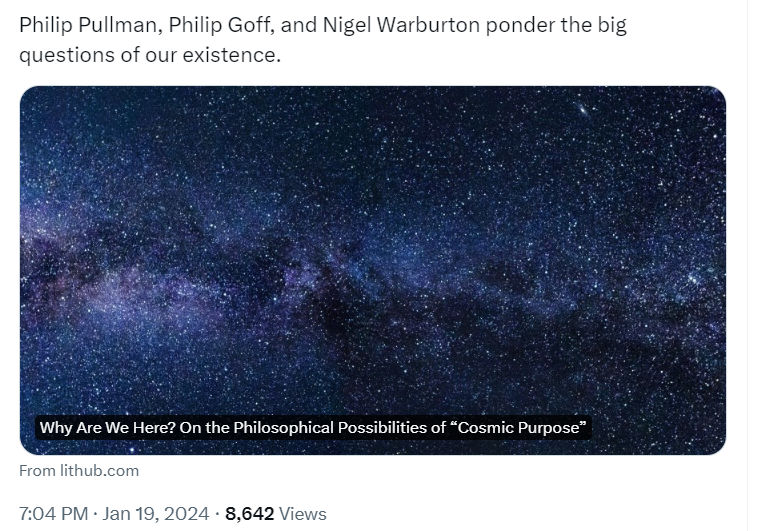
Are Big Questions big questions mainly because people keep on classing them as “big questions” — and thus they endlessly discuss them?
What if some Big Questions are bogus questions?
[See my ‘Bogus Philosophical Questions’.]
Multiple philosophy memes on Twitter/X.

This is the gist.
This or that guy is famous. He’s also deemed to be an important philosopher or scientist. Therefore, every single sentence he ever uttered is deemed to be profound, deep, and worth turning into a X/Twitter meme.
So here’s my own quote:
“Pass me that sandwich.”
Is Analytic Philosophy Isolated From Other Disciplines?

All academic disciplines “operate in isolation from all others” — to varying degrees. That’s true of physics, chemistry, economics, and even Critical Race Theory. (Do Critical Theorists spend much time studying physics, the philosophy of science, chemistry, or even history?) However, analytic philosophy alone seems to get it in face (from political activists, academic experts in “Continental philosophy”, etc.) for being “isolated” That’s odd — much analytic philosophy has also been classed as being “scientistic” and “materialist”. Yet it’s hard to be scientistic or materialist without paying at least some attention to scientific disciplines. And that’s exactly what analytic philosophers have done — dating back to, say, the 1920s!
I can hardly think of a single important analytic philosopher who has isolated himself and his work from other disciplines. In late 20th century terms, many analytic philosophers also paid much attention to physics, biology, cognitive science, AI, mathematics, etc.
So perhaps analytic philosophers isolate themselves only from the particular disciplines that their (mainly academic) critics have in mind.
Perhaps analytic philosophers (as a whole) aren’t political enough in the right kind of political ways.
Perhaps they don’t do the same political things that their critics do.
Perhaps they don’t hold the same politics that their critics do.
And perhaps they don’t see philosophy as simply being just another political weapon — as some of their critics do.
Whatever the case, analytic philosophy as a whole has certainly not “operated in isolation from all other” disciplines. Sure, some individual analytic philosophers might have done so. But who cares about that!
Stop Getting Nietzsche Wrong!
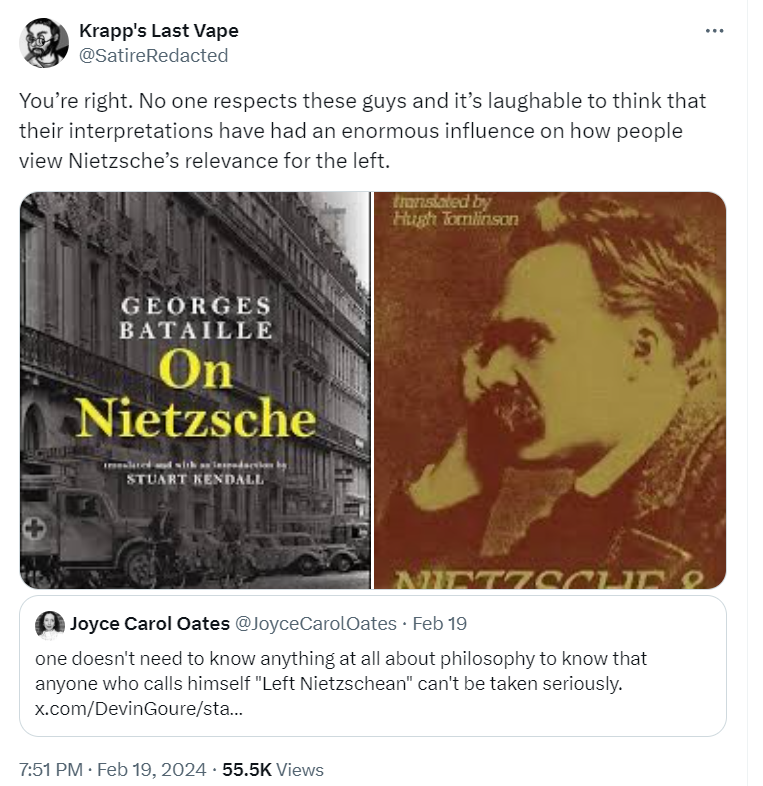
“Stop getting Bond wrong!”
— Alan Partridge

Interpreting Nietzsche is like interpreting the Bible: everyone brings his or her own political, psychological, etc. baggage to the interpretation.
There is a war of all against all.
Thus, people get very hot under the collar about certain “readings” of Nietzsche.
Everything just written also applies to Wittgenstein and Derrida. And it’s largely down to the prose styles of these philosophers.
So, as a matter of interest, how would anyone get a philosopher like Nietzsche (or Derrida/Wittgenstein) right?
The Prose Style of Academics… and Postgraduates
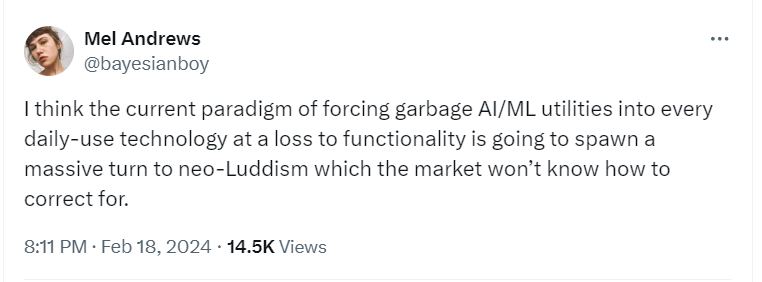
A couple of commas would help in the tweet above.
However, this isn’t a case of a quickly-written tweet. You also find it in many published academic papers. In fact, ultra-long sentences are part of the academic style — at least in some disciplines.
Basically, the prose is either a self-conscious style or simply pure pretence — perhaps both.
The Context of Discovery and the Context of Justification
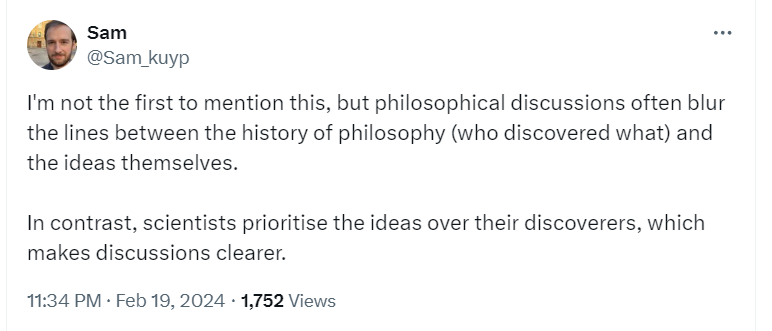
Sam captures the context of discovery and context of justification distinction. It’s not a perfect distinction. And it may well be somewhat of an idealisation or simplification. However, there’s still lots going for it.
In any case, many popular-science writers (though not many scientists themselves) fixate on biography or the context of discovery. And philosophers, not scientists, formulated this distinction in the first place. Of course, most scientists would have been aware of this distinction. However, qua scientists, they’d never tackled it in any great detail.
Do You Hate Academics?
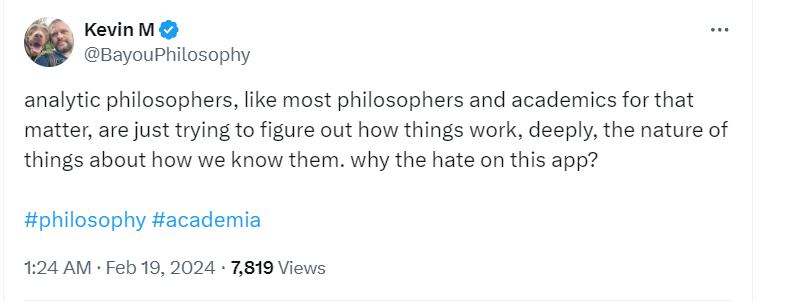
I’m not sure what Kevin M (Kevin Morris) means by “this app”. However, his question “Why the hate?” seems rhetorical.
Does Kevin M mean that he doesn’t understand the criticisms of academics? That he doesn’t agree with the criticisms of academic?
And why use the word “hate” at all?
Does Kevin M hate the “haters”?
He may well say that he doesn’t. In that case, then, perhaps the critics of academics aren’t haters either.
In any case, there are many reasons to criticise (i.e., not “hate”) academics. More accurately, there are many reasons to criticise (many) specific academics about specific issues. Perhaps Kevin M should educate himself about these reasons.
So academics aren’t “just figuring out the nature of things”, as Kevin M claims. In fact, they’re doing all sorts of good and bad things for all sorts of different reasons.
Shorter

Among the many annoying literary tics of the sociologist and political activist Steve Fuller is his tendency to mistake his own rhetorical tweets, and his own obvious political commitments, for Deepness and Profundity.









No comments:
Post a Comment